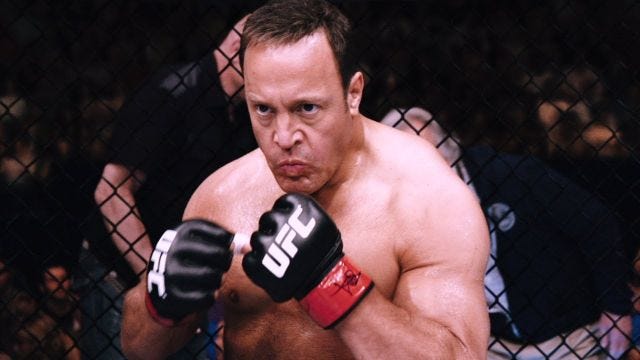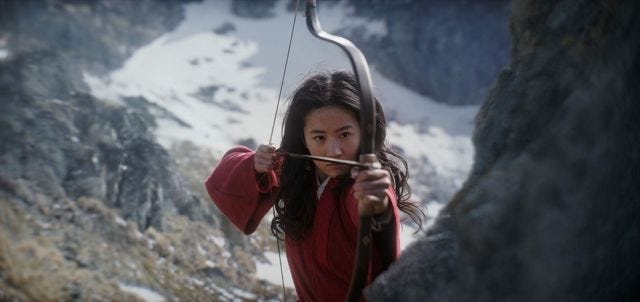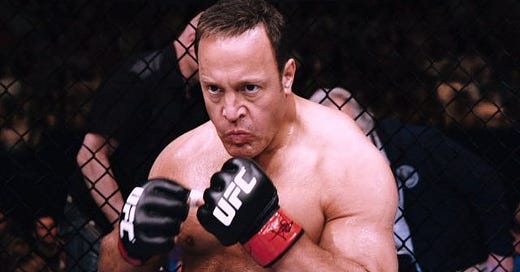
We made it through another week and hoo boy, what a week it was, huh? Our hearts are hopeful, if a little weary and trepidatious. We're crossing our fingers that the truth (and democracy!) will out, but honestly at this point, who can say? We're just here to yell about some movies and disassociate tbh. So allow us to suggest some films we picked up as a way to sort of lighten the mood in darker times, about two very different warriors.
First up, Cate on the light-hearted crowdpleaser Here Comes the Boom. Then we have Zosha on Mulan — and all her disappointments on the 2020 version.

Cate on Here Comes The Boom
Written by: Allan Loeb and Kevin James
Directed by: Frank Coraci
Distributed by: Columbia Pictures

Generally speaking, I don’t like watching people get beat up. I love sports movies (happy to root for whomever the director tells me to) and I have been known to enjoy a Rocky sequel or two. But onscreen violence isn’t something that I gravitate towards. So I was a little surprised by how much I enjoyed rewatching Here Come The Boom given that it is literally a movie about Kevin James volunteering to get beat up to raise money for a high school music program.
In the movie, James plays a checked-out biology teacher named Scott Voss in a struggling high school. When the principal announces that an apparent budget shortfall will mean cutting the music program and eliminating his friend Marty’s job (Henry Winkler) he takes a stand and vows to find a way to come up with the funds himself. When he discovers that MMA fighters win money even when they lose, he hatches a plan to lose all the way to $48,000.
I’m not a fan of a lot of Kevin James’ output. He’s part of the stable of Adam Sandler “let’s hang out and say it was a movie” actors who don’t seem to have tried very hard in the last decade. But this 2012 throwback was a surprisingly sweet and earnest film that reminded me that the man actually has range when he feels like pulling it out.
My favourite aspect of the film is the little village of people he builds along the way to help him achieve his completely ridiculous goal. In addition to Marty, who acts as his fight manager, he trains with his Polish citizenship student Niko (Bas Rutten) who gets him into fighting shape and is bandaged up by the school nurse Bella (Salma Hayek) after he’s injured. There’s also his high school student Malia (Charice) who helps Niko study while Scott trains, and of all people, Joe Rogan (playing himself) who takes a liking to Scott for his enterprising “don’t quit” spirit. All together, they help him get to fights, train, stick to his diet, tend to his injuries and generally keep him in the game, and building to his goal.
Eventually, Scott gets the chance to join a real UFC fight, with a $10,000 loser’s pot that would put him right over his funding goal. But when in the third act, it turns out that the school’s friendly vice principal has been embezzling money from the budget all along—taking Scott’s winnings with him—he decides to try to win the fight instead. The $50,000 prize would replace the stolen cash and save the program.
And I have to hand it to James, he sells the fight. Losing badly in the first two rounds, he takes a pounding. His opponent is dangerous and highly skilled and he comes at Scott with a terrifying force. He punches Scott so badly in the second round that he has trouble making it back to his corner when the bell calls. But Marty comes through with an inspirational speech to rival all the other sports movies I love. He tells Scott not to worry about winning because he’s already accomplished his job as a teacher—to inspire his students. (Conveniently, the school band has been flown out to Vegas on Joe Rogan’s dime to witness the fight.)
But enough about that. The rising emotional swell of seeing Scott decide in that moment that he would win because he had people to look after, and a team rooting for him and lives in the balance? LOVED IT. I never thought I’d be so moved watching a bunch of dudes kick the shit out of each other. I didn’t love the violence, but I did love that the UFC fight was a venue in which we could see genuine platonic emotional affection between men that was deep and sincere. The cheering and joy when Scott knocks his opponent out is visceral. He earns not only the cash he needs to save his friend’s job and the school, but he confirms for himself that he can push through the malaise he’s been living through and actually care about the people in his community again.
Here Comes The Boom isn’t the best movie in the world (Creed and Creed II will get you beatings and a great story) but it’s sentimental, gripping and funny. It was perfect for the injection of lightness that I needed this week and I’m so pleased I spent some time with it. I promise you won't regret it if you do too.

Zosha on Mulan
Written by: Rick Jaffa, Amanda Silver, Lauren Hynek, and Elizabeth Martin
Directed by: Niki Caro
Distributed by: Disney

From the jump, Mulan is a vivid reimagining of, well, Mulan (1998). It is visually stunning, filled with beautiful rugged landscapes, bright colors, and stunning costume designs. So it is a shame that everything else about it seems so flat and poorly thought through.
The story is essentially the same legend we know and love: Hua Mulan (Liu Yifei), a skilled warrior who has to hide her gifts to be more womanly, heads off to war to spare her invalid father (Tzi Ma). She disguises herself as a man and trains with the Imperial Army, and hopes to defend China against the invading Rouran warriors, aided by Xian Lang (Gong Li), a witch whose magical prowess rivals only Mulan’s.
On the one hand, the film does what it can to not be a straightforward remake the way The Lion King (2019) was. As Xian Lang’s presence implies, there’s new players, new threads, and new aspects to explore in Mulan’s story. On the other, there’s nothing the film really does to actually explore those issues; pretty much everything in the plot that feels sophisticated comes from the animated film, and everything updated feels half-baked.
The updated feminism of the story — if we can go as far as to call these politics “updated” — don’t add up to much. Instead of Mulan’s bravery mattering because she chose to make an impossible decision and risk death to save her father from the same fate, it’s consequential because she is powerful, laden with “qi” (which could be swapped out for “the force” without any ruffled feathers, and make more sense, as it’s not really a Western misunderstanding of an actual belief system). Over and over again the film seems to drive home that Mulan could defy these patriarchal standards not because they are inherently sexist and worthy of dismissal, but because she is special and can transcend. If only all women had such power, we wouldn’t be in this mess, they could just pull some tricks from wuxia films!
So ultimately Mulan’s great victory — spoilers for a 22 year old movie and a thousands-year-old legend: she saves the country and specifically the emperor — feels hollow, because...well, nothing changes! The battalion that rose behind her pointedly opts to because they knew they could trust her, not that they’ve really learned a lesson about gender roles. Mulan shrugs off compliments from the emperor saying that she doesn’t deserve them because she deceived everyone, and people are like “yes, fair.” Yes, they ultimately bring her into the emperor’s guard, but we don’t get a sense that anything has holistically changed, so much as it would be obviously dumb to not include this ~special~ warrior.
These conclusions would perhaps feel less hollow if they amounted to much of any sort of emotional payoff, but if you’ll remember, Mulan’s cardinal sin is not wanting to be associated too closely with its predecessor. The problem is, the songs of Mulan (1998) were vital to the film; it’s a musical, so songs represent moments when characters speak their truth or change their minds. To simply pull the songs out and move the plot along — well, it does just that, and it leaves Mulan and Mulan feeling very emotionally flat, no matter what Liu does with the role. There are very few stakes to her story anymore, because she has always been a perfect warrior, she just hasn’t been allowed to show it. Once she is allowed — either because her friends think she’s a man, or they’ve just changed their minds and decided she should be able to — then that just happens too.
Every major change to the story ends up feeling too localized and modest, refusing to reckon with the heft the story demands (which 1998’s Mulan did in a deceptively thoughtful way, like the fact that all the musical elements end abruptly once the true brutality of war appears and hers is the only army group left). The most electric the film feels is when Mulan squares off with Xian Long, rendered stunningly by Gong Li. Both women are talked down to and belittled, forced to hide parts of themselves and serve men who don’t respect them because they are women. And yet, Mulan is thinking only to the extent that Xian Long can represent evil Mulan can refuse, not a serious consideration.
In Liu’s hands (as well as the film’s), Mulan is a bundle of contradictions: She honors her father by disobeying everything he asked of her; she stands out at camp because she tries to blend in; she fights for China’s traditions because they spurn her so much. But too often these things hinge on betraying a Western sensibility (the film is penned by four White Americans). Mulan’s big reveal to her comrades comes when she strides across the battlefield, hair flowing in the wind — except, her hair would be this length if she were a man as well, in Chinese culture at the time. Her girl power is acceptable so long as she balances the idea that she shouldn’t have to hide it, but she also shouldn’t lie. Indeed even Xian Long (my love, in case that wasn’t clear) tells her that subservience is “dulling” her qi.
In another film, this could be a well-pointed critique — how many societies do we have where a Mulan might not be able to save the empire because she is busy being forced into a life she doesn’t want? In this one it feels hollow, almost dismissive of the idea that maybe a man’s definition of the force “qi” shouldn’t be the gold standard.
I think, 22 years on, we can accept that the story of Mulan that most of us in the Western world know is extremely Westernized and that it is not a representative artifact of either the “real” Hua Mulan or Chinese culture. But with Mulan (2020), we are left with an even hollower imitation of a more nuanced film. But, y’know, beautiful gowns.

Assorted Internet Detritus
Cate: To be completely honest I checked out of election coverage on Saturday when the race was called. Joseph Robinette Biden is the president now and I don't acknowledge any other reality. Consequently I had lots of time to read fun things. First, this remembrance of Practical Magic on it's 20th anniversary, this searing essay from Dr. Tressie Mc Millan Cottom about who has the right to be a basic bitch, this fun little investigation of why on earth Ana de Armas is suddenly everywhere, and lastly, my own review of Justin Simien's Bad Hair, a very bad movie that I did not like.
Zosha: It took my brain a little while to come back online after all The News, but some stuff I managed to read this week: AOC on where we go from here. Media gossip with behind the scenes of the NYT reckoning. A personal look at the novel "My Dark Vanessa" written by the great Angelica Jade Bastién (content warning for abuse). Why throwing money at elections across the country might not pay off. And brilliant friends of mine who are building a new newsletter and balancing celebrating and bullying Kamala (this last one is Cate!).
And with that, we're done. Issue #26 will be coming at you next Friday. See you then!
Stretching and resting, but still finding ways to yell about movies.
Zosha + Cate <3
Twitter: @30FlirtyFilm
Instagram: @30FlirtyFilm




